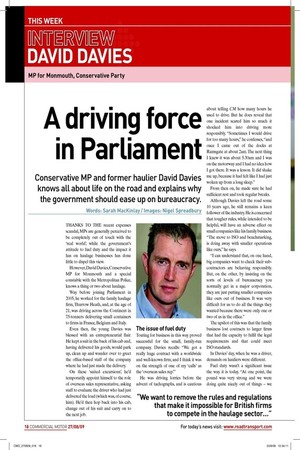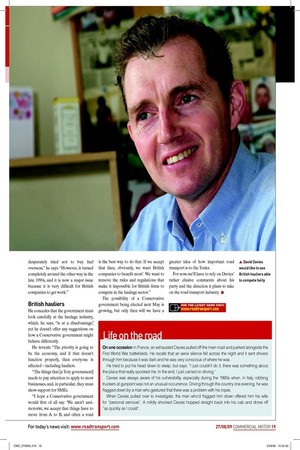A driving force in Parliament
Page 18

Page 19

If you've noticed an error in this article please click here to report it so we can fix it.
Conservative MP and former haulier David Davies knows all about life on the road and explains why the government should ease up on bureaucracy.
Words: Sarah MacKinlay / Images: Nigel Spreadbury
THANKS TO THE recent expenses scandal, MPs are generally perceived to be completely out of touch with the ‘real world’, while the government’s attitude to fuel duty and the impact it has on haulage businesses has done little to dispel this view.
However, David Davies, Conservative MP for Monmouth and a special constable with the Metropolitan Police, knows a thing or two about haulage.
Way before joining Parliament in 2005, he worked for the family haulage irm, Thurrow Heath, and, at the age of 21, was driving across the Continent in 7.5-tonners delivering small containers to irms in France, Belgium and Italy.
Even then, the young Davies was blessed with an entrepreneurial lair. He kept a suit in the back of his cab and, having delivered his goods, would park up, clean up and wander over to greet the ofice-based staff of the company where he had just made the delivery.
On these ‘suited excursions’, he’d temporarily appoint himself to the role of overseas sales representative, asking staff to evaluate the driver who had just delivered the load (which was, of course, him). He’d then hop back into his cab, change out of his suit and carry on to the next job.
The issue of fuel duty
Touting for business in this way proved successful for the small, family-run company. Davies recalls: “We got a really huge contract with a worldwide and well-known irm; and I think it was on the strength of one of my ‘calls’ as the ‘overseas sales rep’.” He was driving lorries before the advent of tachographs, and is cautious about telling CM how many hours he used to drive. But he does reveal that one incident scared him so much it shocked him into driving more responsibly. “Sometimes I would drive for too many hours,” he confesses, “and once I came out of the docks at Ramsgate at about 2am. The next thing I knew it was about 5.30am and I was on the motorway and I had no idea how I got there. It was a lesson. It did shake me up, because it had felt like I had just woken up from a long sleep.” From then on, he made sure he had suficient rest and took regular breaks.
Although Davies left the road some 10 years ago, he still remains a keen follower of the industry. He is concerned that tougher rules, while intended to be helpful, will have an adverse effect on small companies like his family business. “The move to ISO and benchmarking, is doing away with smaller operations like ours,” he says.
“I can understand that, on one hand, big companies want to check their subcontractors are behaving responsibly. But, on the other, by insisting on the sorts of levels of bureaucracy you normally get in a major corporation, they are just putting smaller companies like ours out of business. It was very dificult for us to do all the things they wanted because there were only one or two of us in the ofice.” The upshot of this was that the family business lost contracts to larger irms that had the capacity to fulil the legal requirements and that could meet ISO standards.
In Davies’ day, when he was a driver, demands on hauliers were different.
Fuel duty wasn’t a signiicant issue the way it is today. “At one point, the pound was very strong and we were doing quite nicely out of things – we desperately tried not to buy fuel overseas,” he says. “However, it turned completely around the other way in the late 1990s, and it is now a major issue because it is very dificult for British companies to get work.”
British hauliers
He concedes that the government must look carefully at the haulage industry, which, he says, “is at a disadvantage”, yet he doesn’t offer any suggestions on how a Conservative government might behave differently.
He reveals: “The priority is going to be the economy, and if that doesn’t function properly, then everyone is affected – including hauliers.
“The things that [a Tory government] needs to pay attention to apply to most businesses, and, in particular, they must show support for SMEs.
“I hope a Conservative government would irst of all say: ‘We aren’t antimotorist, we accept that things have to move from A to B, and often a road is the best way to do that. If we accept that then, obviously, we want British companies to beneit most’. We want to remove the rules and regulations that make it impossible for British irms to compete in the haulage sector.” The possibility of a Conservative government being elected next May is growing, but only then will we have a greater idea of how important road transport is to the Tories.
For now, we’ll have to rely on Davies’ rather elusive comments about his party and the direction it plans to take on the road transport industry. ■
Life on the road
On one occasion in France, an exhausted Davies pulled off the main road and parked alongside the First World War battlefields. He recalls that an eerie silence fell across the night and it sent shivers through him because it was dark and he was very conscious of where he was.
He tried to put his head down to sleep, but says: “I just couldn’t do it; there was something about the place that really spooked me. In the end, I just carried on driving.” Davies was always aware of his vulnerability, especially during the 1990s when, in Italy, robbing truckers at gunpoint was not an unusual occurrence. Driving through the country one evening, he was flagged down by a man who gestured that there was a problem with his ropes.
When Davies pulled over to investigate, the man who’d flagged him down offered him his wife for “personal services”. A mildly shocked Davies hopped straight back into his cab and drove off “as quickly as I could”.


























































